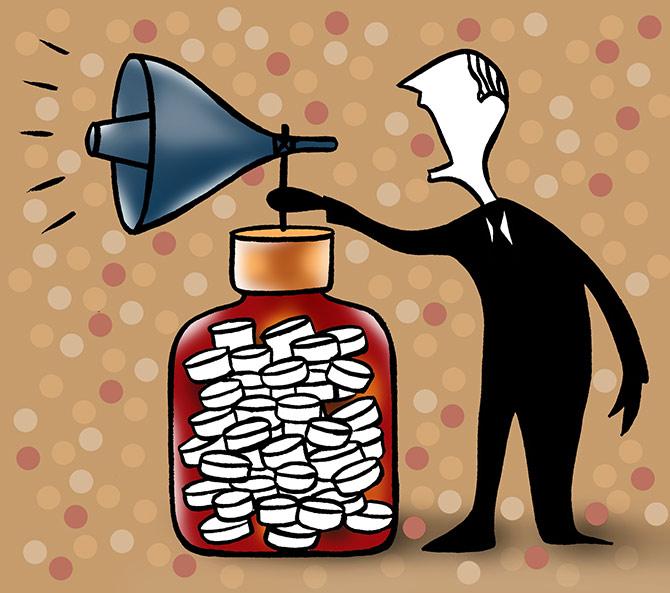Overall slowdown in the economy and growing volumes of unbranded generic medicines in the domestic market are behind poor sales.
Illustration: Uttam Ghosh/Rediff.com

Sales volume of pharmaceutical products have been growing in low single digits for the past few quarters - something drugmakers attribute to an overall slowdown in the economy and growing volumes of unbranded generic medicines in the domestic market.
The data from the market research firm AIOCD Pharmasofttech AWACS showed that volume growth has not been showing an encouraging upward trend for the past few months.
Ameesh Masurekar, director, AIOCD AWACS, said volume growth in the Indian pharmaceutical market (IPM) has been in the slow lane (in the 2-3 per cent range) since July last year.
For April, the volumes in the IPM grew 2.8 per cent, compared to a 5.2 per cent rise in prices.
For the 12-month period ended in April, the volume growth came in at 3.4 per cent, while the prices grew by 4.1 per cent.
Also, since July last year, the price growth in the non-price controlled category (drugs outside the National List of Essential Medicines, or NLEM) has beaten growth in the NLEM segment consistently every quarter.
“There is a general slowdown in the economy and the broader signs are bad.
"People are not buying medicines beyond the essentials.
"When there is slowdown in consumer demand, there is a spillover effect even on the so-called sunshine industries like pharma, where demand is expected to be round the year,” said the promoter of a Gujarat-based multinational drug firm.
Another reason behind this slowdown in volumes is the growth of unbranded generics.
“Of late, there has been a lot of focus (by the government) and increasing awareness around the generic generic medicines that are sold usually through the government channels.
"While these drugs hardly make an impact in terms of value, they do take away some volumes from the market,” said a senior official of a Mumbai-based pharma company.
Analysts seemed to agree.
Edelweiss has noted in a recent note that there is growing awareness about cheaper alternatives to branded generics and more channels providing access to them has started to impact volume growth for branded generics.
The brokerage felt that the revenue of the Jan Aushadhi scheme is expected to double year-on-year in 2019 to around Rs 300 crore.
It further added that Rs 120 crore sales of the Bureau of Pharma PSUs of India corresponds to nearly Rs 600 crore of branded medicines.
There are around 5,000 Jan Aushadhi stores, and another 2,000 are expected to be opened by 2020.
These stores offer drugs at almost 50-90 per cent discount to their branded counterparts.
Now, back-of-the-envelope calculations show that if each Jan Aushadhi store sells Rs 5 lakh worth of medicines by 2020-21, the scheme’s top line would be Rs 600 crore.
Assuming an average price differential of five times, this can potentially disrupt Rs 25,000-30,000-crore worth sales of branded generics.
In short, by 2020-21, the Jan Aushadhi scheme has the potential to disrupt 20 per cent of the IPM sales.
Pharma companies, too, have enhanced focus on the non-NLEM category to protect their margins.
“In the NLEM category, the price change every year is determined by the wholesale price index (WPI).
"In a year the WPI is down, the drug firms have to reduce prices, but the volumes go up as a result. In the non-NLEM category, companies can raise prices by up to 10 per cent in a year and the recent data seems to suggest that the overall volumes have not grown in the domestic market,” said a senior official from a Mumbai-based drug firm.
The drug manufacturers lobby pointed out that the regulatory and pricing issues have been ailing the industry in the last few years.
“Regulatory and pricing issues have affected the market in the last few years.
"The AIOCD AWACS data captures the retail channels and maybe does not appropriately reflect the generic sales through government channels, including Jan Aushadhi stores, etc,” said Deepnath Roy Chowdhury, president, Indian Drug Manufacturers Association.












 © 2025
© 2025